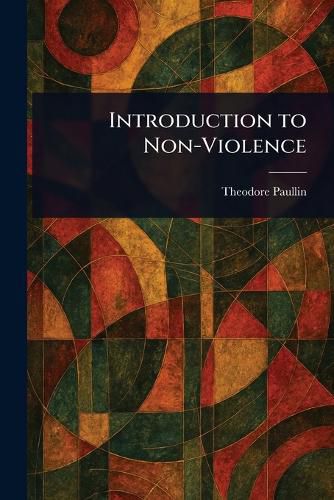Readings Newsletter
Become a Readings Member to make your shopping experience even easier.
Sign in or sign up for free!
You’re not far away from qualifying for FREE standard shipping within Australia
You’ve qualified for FREE standard shipping within Australia
The cart is loading…






This title is printed to order. This book may have been self-published. If so, we cannot guarantee the quality of the content. In the main most books will have gone through the editing process however some may not. We therefore suggest that you be aware of this before ordering this book. If in doubt check either the author or publisher’s details as we are unable to accept any returns unless they are faulty. Please contact us if you have any questions.
"Introduction to Non-Violence" by Theodore Paullin offers a comprehensive exploration of pacifism and its practical application. This seminal work, categorized within Social Sciences, delves into the core tenets of non-violence as a philosophy and a tool for social change. Paullin examines the ethical dimensions of pacifism, providing a foundational understanding of its principles. Exploring the intersection of peace studies and social justice, this book provides readers with essential insights into the theory and history of non-violent resistance. A valuable resource for anyone interested in ethics, political science, and the pursuit of peace, this meticulously prepared edition makes a classic text accessible to a wide audience. This book is an important contribution to the fields of political philosophy and sociology, examining paths towards a more just and peaceful world.
This work has been selected by scholars as being culturally important, and is part of the knowledge base of civilization as we know it.
This work is in the public domain in the United States of America, and possibly other nations. Within the United States, you may freely copy and distribute this work, as no entity (individual or corporate) has a copyright on the body of the work.
Scholars believe, and we concur, that this work is important enough to be preserved, reproduced, and made generally available to the public. We appreciate your support of the preservation process, and thank you for being an important part of keeping this knowledge alive and relevant.
$9.00 standard shipping within Australia
FREE standard shipping within Australia for orders over $100.00
Express & International shipping calculated at checkout
This title is printed to order. This book may have been self-published. If so, we cannot guarantee the quality of the content. In the main most books will have gone through the editing process however some may not. We therefore suggest that you be aware of this before ordering this book. If in doubt check either the author or publisher’s details as we are unable to accept any returns unless they are faulty. Please contact us if you have any questions.
"Introduction to Non-Violence" by Theodore Paullin offers a comprehensive exploration of pacifism and its practical application. This seminal work, categorized within Social Sciences, delves into the core tenets of non-violence as a philosophy and a tool for social change. Paullin examines the ethical dimensions of pacifism, providing a foundational understanding of its principles. Exploring the intersection of peace studies and social justice, this book provides readers with essential insights into the theory and history of non-violent resistance. A valuable resource for anyone interested in ethics, political science, and the pursuit of peace, this meticulously prepared edition makes a classic text accessible to a wide audience. This book is an important contribution to the fields of political philosophy and sociology, examining paths towards a more just and peaceful world.
This work has been selected by scholars as being culturally important, and is part of the knowledge base of civilization as we know it.
This work is in the public domain in the United States of America, and possibly other nations. Within the United States, you may freely copy and distribute this work, as no entity (individual or corporate) has a copyright on the body of the work.
Scholars believe, and we concur, that this work is important enough to be preserved, reproduced, and made generally available to the public. We appreciate your support of the preservation process, and thank you for being an important part of keeping this knowledge alive and relevant.